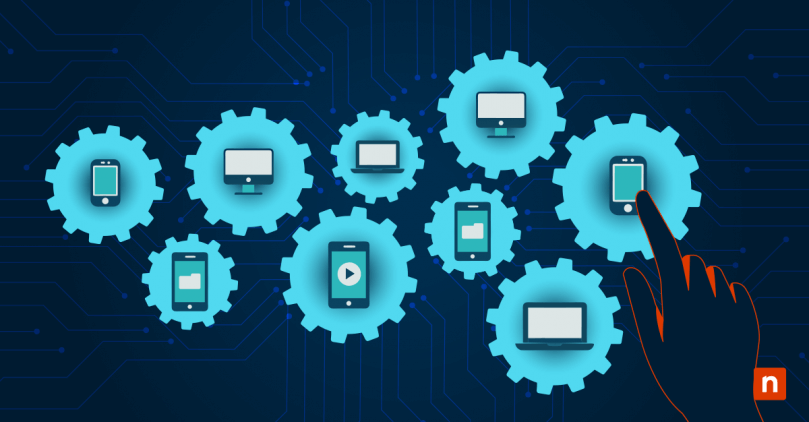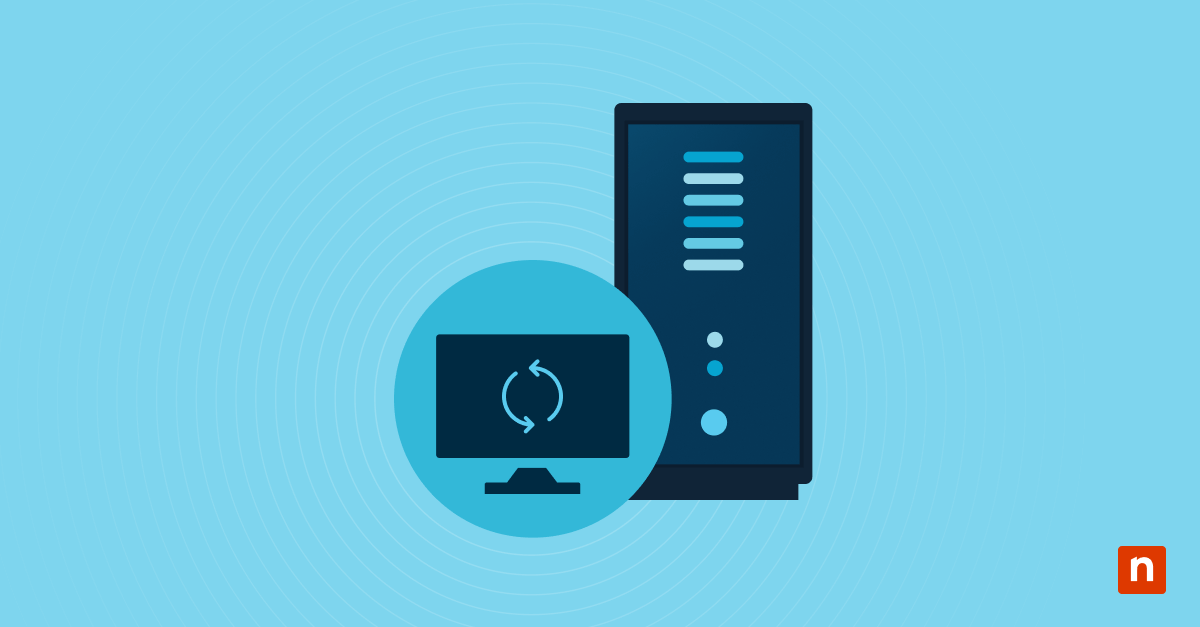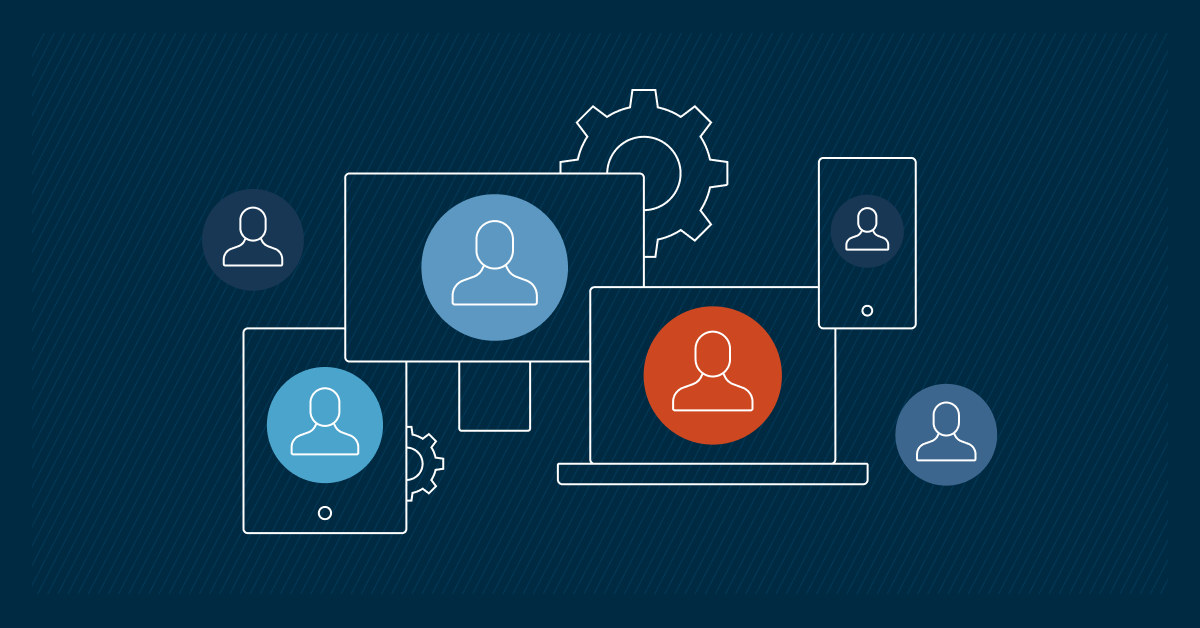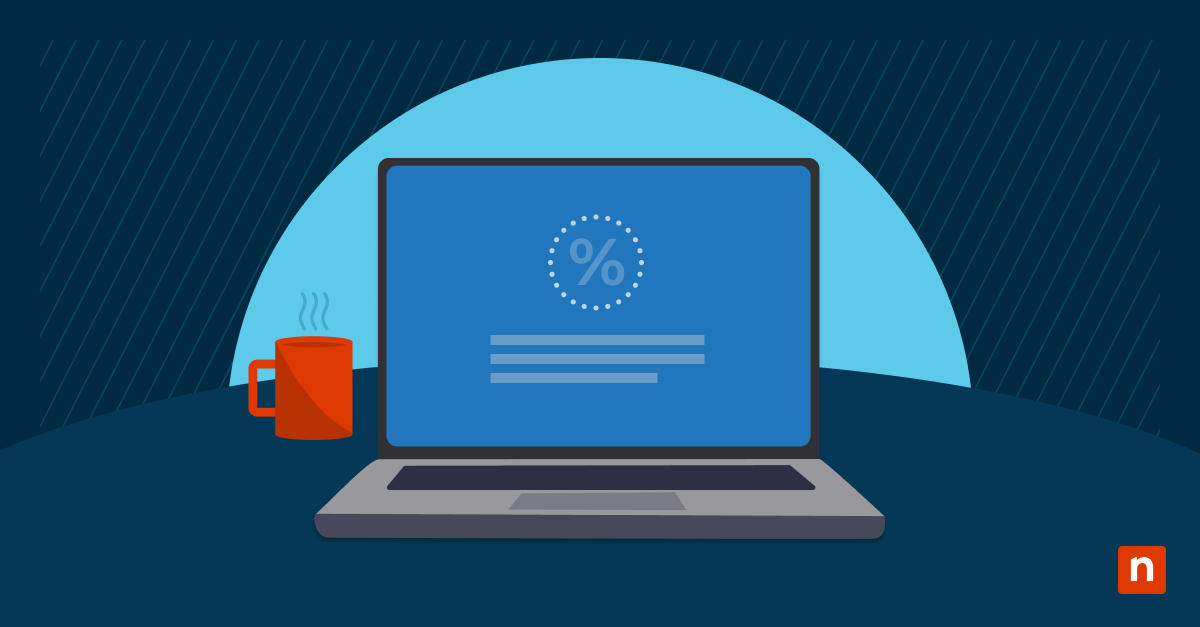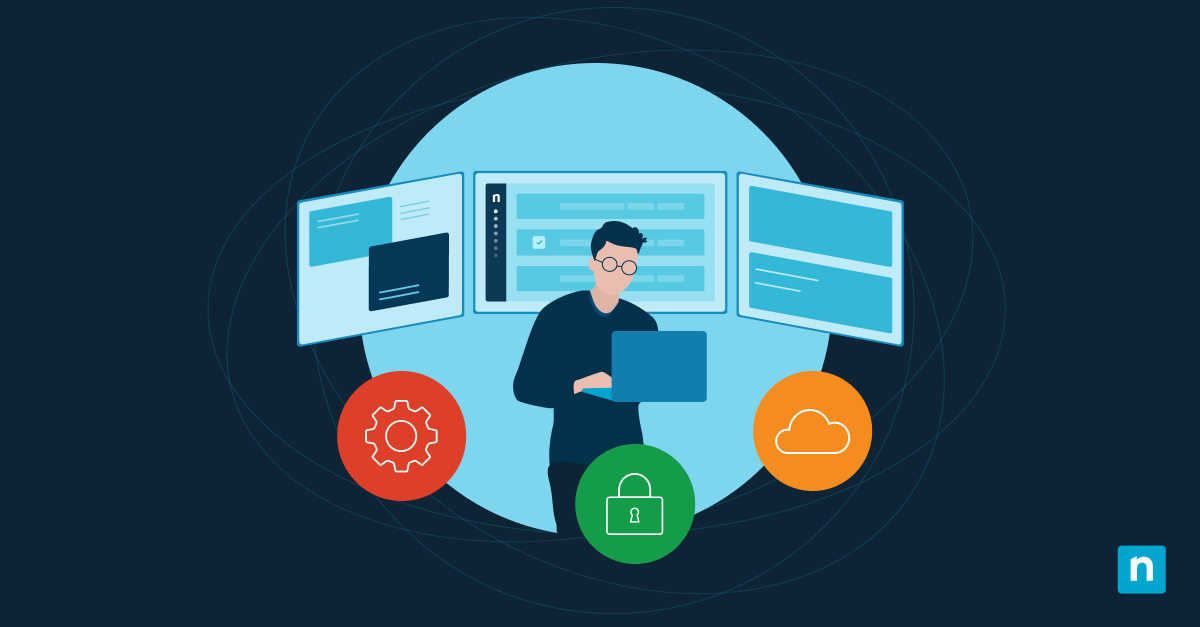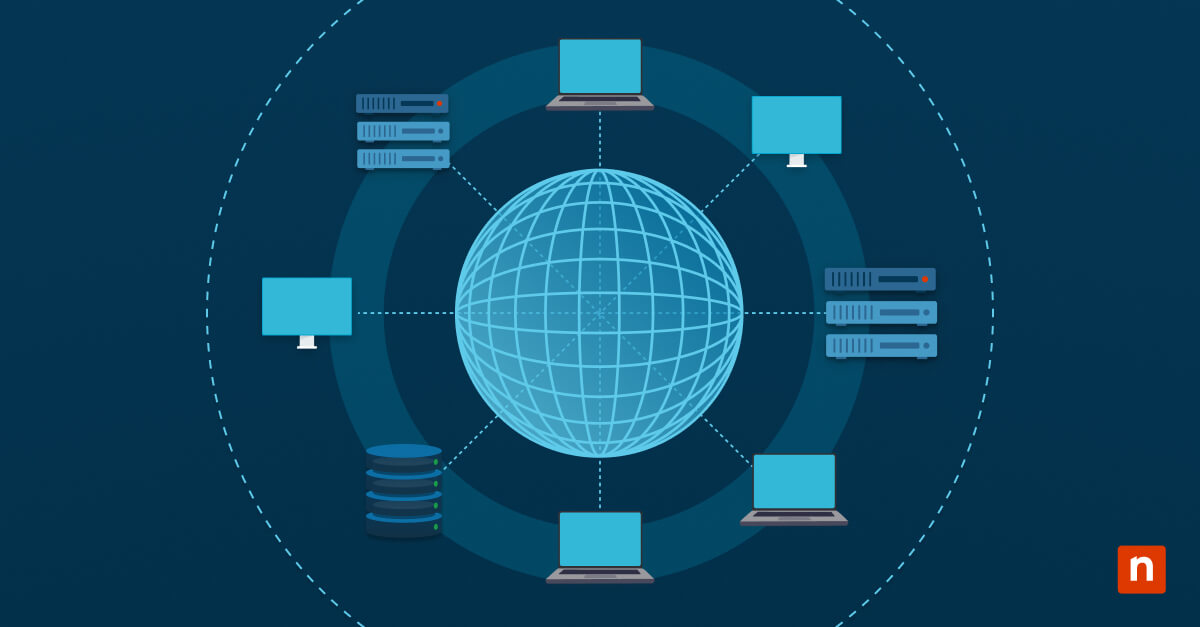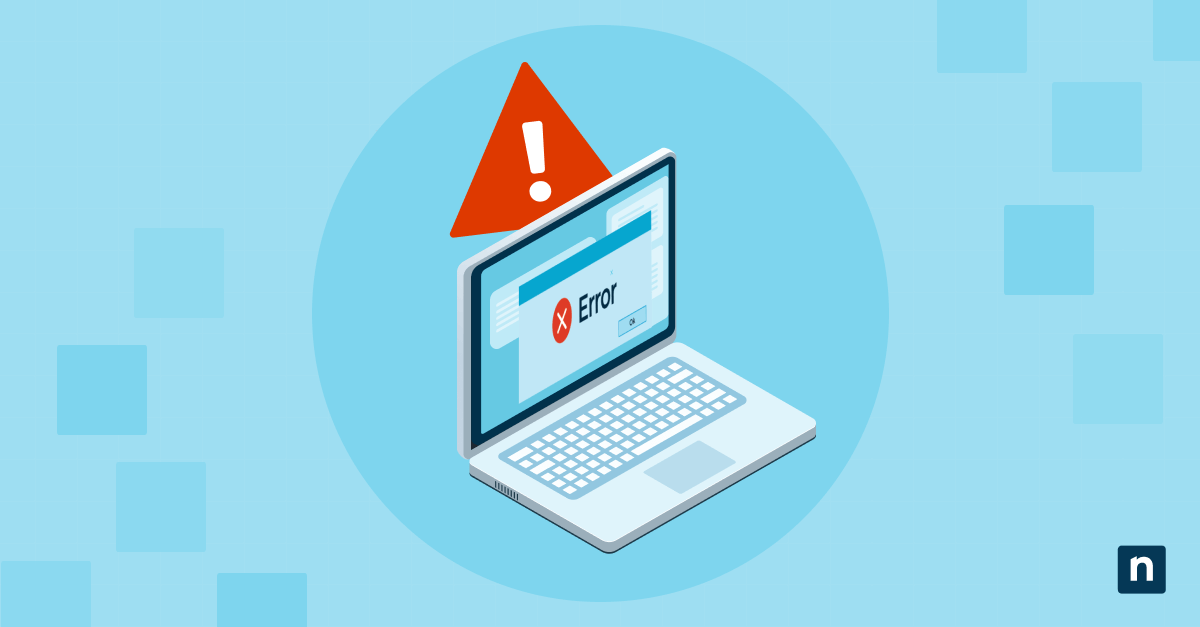Key Points
- Endpoint management secures, monitors, and optimizes all devices connected to an organization’s network.
- Implement device management by provisioning, configuring, and updating endpoints through centralized controls.
- Enable remote monitoring and management to troubleshoot, track assets, and wipe compromised devices.
- Apply application management with consistent deployment, patching, and removal of unauthorized software.
- Enforce security and compliance through endpoint protection, access controls, threat detection, and policy audits.
The health and security of each device affect the entire organization. An unhealthy endpoint creates a significant security risk. IDC reports that laptops, desktops, and mobile devices account for 70% of successful breaches. Because endpoints often serve as entry points for attacks, organizations must implement strong endpoint management.
Enhance productivity and eliminate disruptive downtime by streamlining your endpoint management with NinjaOne.
Start your free trial
What are endpoints?
Before we discuss endpoint management, let’s define an endpoint. Endpoints are remote units connected to a network or applications. Since they can comprise multiple device types, they require a robust endpoint management strategy to maintain security and productivity.
What are examples of endpoints?
Endpoints include different device types ranging from traditional computing instruments to mobile tools. Examples of endpoints include:
- Laptops
- Desktops
- Tablets
- Smartphones
- Smartwatches
- Workstations
- Servers
- Internet of Things (IoT) devices
What is endpoint management?
Endpoint management includes provisioning, monitoring, securing, remediating, and updating endpoints to protect the IT environment. The IT team performs these tasks to maintain endpoint health. This process secures the network against breaches and supports uptime and productivity.
What are the components of endpoint management?
Endpoint management can be used in several different areas within your IT team. Here are the components that encompass an endpoint management process:
1. Device management
- Mobile device management (MDM): This pertains to managing mobile devices such as smartphones and tablets. MDM includes app management, enforcing security policies, device tracking, disabling, and more.
- Inventory and discovery: Inventory and discovery pertain to identifying and tracking all endpoints within the network.
- Device configuration: Device configurations are applied by pushing updates through centralized management consoles.
- Deployment: Provisioning and deploying endpoints to users. This includes everything from hardware and software setup to profile configuration.
2. Remote monitoring and management
- System monitoring: Refers to the continuous monitoring of endpoints to maintain optimal health, performance, and system health.
- Remote troubleshooting: Allows technicians to provide remote technical support and resolution.
- Asset management: Tracking and managing hardware and software assets throughout their lifecycle.
- Network management: Pertains to tasks that involve network monitoring of its performance, connectivity issues, and more.
- Remote data wiping: Refers to the remote removal of information from a device in the event of compromise, theft, or loss.
3. Application management
- Software distribution: Tasks that involve consistent software package delivery or deployment to endpoints for homogenous installation.
- Patch management: Helps address vulnerabilities by identifying, testing, and pushing updates and bug fixes to endpoints.
- Application deployment: The installation and configuration of authorized applications across endpoints within a network.
- Application removal: The process of uninstalling obsolete or unnecessary applications from devices.
4. Security
- Endpoint protection: The process of maintaining security across endpoints in your network by integrating various security technologies for comprehensive protection.
- Data Loss Prevention (DLP): The process of protecting sensitive data from unauthorized access, leaks, destruction, and everything that could be a result of cyber attacks.
- Access control: Pertains to restrictions on a network to prevent unauthorized access.
- Threat detection and response: Identifying and responding to advanced threats, including malware, ransomware, and zero-day attacks using EDR tools.
- Password control and management: The management of passwords such as enforcement of strong password policies, password resets, implementing secure password management tools, employing multi-factor authentication, and many more.
- Disabling stolen devices: Much like data wiping, disabling devices can be done remotely to prevent bad actors from obtaining sensitive company data.
5. Compliance
- Policy enforcement: Ensuring compliance with organizational and regulatory standards.
- Audit and reporting: Report generation on endpoint security and compliance status.
- Remediation: Addresses compliance issues as a response to vulnerability identification.
- Risk assessment: Evaluating potential threats and vulnerabilities to determine the likelihood and impact of security incidents.
What is remote endpoint management?
Through remote endpoint management, IT teams can maintain endpoints, monitor network activity, and troubleshoot issues promptly while remaining remote. This relieves the burden on, IT departments that would regularly use other models to manage remote teams. In addition, this process improves IT efficiency and lowers the chances of exposing endpoints and corporate data to security vulnerabilities.
What is endpoint management software?
Endpoint management software is a tool used to accomplish the tasks involved in endpoint management. It continuously monitors the devices in an IT environment and checks the status of endpoints. This enables you to manage your IT environment and resolve problems before they escalate proactively.
Why is endpoint management important?
Endpoint management is crucial for organizations because it provides an excellent visual of the status and health of devices. It allows you to account for and be aware of all endpoints and preemptively take action to protect your endpoints. Staying on top of software updates and remediating issues results in more secure devices and a secure IT environment.
With the rise of people bringing their devices to work, it is challenging for IT teams to secure networks, and the number of security threats has escalated. These threats are also more sophisticated than ever, so policies need to be in place to ensure endpoint security for a remote workforce.
In a study conducted on endpoint security, Ponemon found that 68% of organizations had their data or IT infrastructure compromised by endpoint attacks. Since these attacks are so commonplace, endpoint management has become necessary to protect your organization.
What are endpoint management policies?
The importance of endpoint management is relevant to the benefits it brings to an organization, IT teams, and end-users. Policies, nevertheless, help amplify these advantages to ensure efficient endpoint management.
At its core, endpoint management policies are a set of standards or guidelines that govern the configuration, security, and behavior of endpoint devices within an organization. These policies dictate the efficiency of endpoint management and all the tasks involved in the process. Some examples of endpoint management policies are as follows:
- Requiring strong passwords and regular password changes.
- Enforce full disk encryption for sensitive data.
- Mandating regular software updates and patch management.
- Blocking unauthorized applications and websites.
- Implementing remote wipe capabilities for lost or stolen devices.
What are the benefits of endpoint management policies?
Devices As mentioned above, endpoint management policies have advantages that foster effective IT management. Here are some of those:
Enhanced security: This protects endpoints and organizations from cyber threats such as malware and ransomware. These threats, which can be executed through sneaky attacks, may cause revenue loss, reputation tarnishing, destructive data breaches, and workflow disruptions.
Data protection: Adjacent to security enhancement, data protection is one of the main goals for enforcing robust security. This prevents data loss and unauthorized access to sensitive data that bad actors may use to exploit or extort an organization.
Compliance adherence: Organizations must follow industry regulations and compliance standards, which should apply to how their endpoints operate. Endpoint management policies ensure that devices owned by an organization comply with these regulations, reducing the risk of penalties and reputational damage.
Risk mitigation: Identifies and addresses potential vulnerabilities, which can streamline device management and reduce IT support costs. One of its main benefits is productivity building, which is essential to every organization.
Who needs endpoint management?
As the use of technology and digital data increases in various organizations and industries, most of them would benefit from endpoint management. Endpoint management is needed by practically any organization that has endpoint devices connected to its network or applications. Major industries that benefit from the use of endpoint management are:
Information Technology (IT)
Since the IT industry uses technology and digital resources for their everyday work, it is absolutely essential to take necessary precautions to ensure that access to their digital data is updated, remediated, and secured. In addition, one compromised endpoint can affect the entire business, so taking steps beforehand could prevent security threats from compromising customer data or business workflows.
Banking, Financial Services, Insurance (BFSI)
Banks and other financial institutions store sensitive personal and financial information for customers and the company at large. If this information is not efficiently secured, it could be exploited and result in huge losses. This can have dire effects on customers and could potentially be catastrophic for businesses in the BFSI industry. Therefore, guaranteeing that BFSI endpoints are monitored, remediated, updated, and secured helps prevent these losses from occurring or minimize losses.
Healthcare
Patients’ private health information is stored in a large database in the healthcare industry. Doctors and other healthcare providers can access this information through various endpoints. If the security of a single endpoint is compromised, then patient information is compromised. This is a violation of the Health Insurance Portability and Accountability Act (HIPAA), which was instituted to protect patient privacy while still allowing the proper flow of information for patients to receive the highest quality of care. Endpoint management also supports updates and remediations for these endpoints to guarantee that this information is always ready to access and given access to those who need it.
Education
The education industry is also enticing to hackers because of the vast amount of secure data these organizations gather. Personal information about past and current students or staff, grades and grade point averages, records, and other sensitive information enables schools to operate continually. Academic institutions are responsible for protecting the security and integrity of confidential information. Endpoint management is a critical component of cybersecurity in education.
Retail
An increasing number of individuals in retail are using new devices and technology to both assist customers and carry out business responsibilities. Endpoint management helps to ensure smooth and successful transactions with consumers in these businesses. It also supports business workflows and increases productivity. With a growing number of unknown attacks that can compromise the flow of business, retail companies often consider implementing endpoint management as part of their security solutions.
Government
Government sectors have increased their use of technology and the digitalization of organizational information. The use of IT in government comes with multiple benefits, such as automation and having a central location to store information. However, security risks come with using it to store confidential information. Governments across the globe have experienced various cyberattacks that put stored information at risk. Endpoint management is an excellent solution for various sectors to protect data and increase cybersecurity.
Tech and software
Software and technology companies. As an increasing number of people choose to work remotely, from home or elsewhere, the need for secure data protection in this industry is also increasing. It is crucial to protect both customers’ and employees’ private and sensitive information in this industry. Implementing endpoint management is a wise preventative measure to accomplish this.
Construction and manufacturing
People who work in construction and manufacturing are not usually all together in a single location. Typically, they are heavily distributed in the field or a factory. Because of this, it is challenging to ensure that all devices used within the company are up-to-date and secure. For example, endpoint management monitors and manages the spread-out tech devices from a single location.
Professional services
The term “professional services” encompasses accountants, lawyers, etc., or companies that do activities such as consulting and recruiting. Employees of these organizations have sensitive data stored on their devices while also traveling abroad or working from home to accomplish their duties. Since business members are not located in a central location, remote endpoint management can actively work to protect these devices containing important secure data.
Other
Many other industries can benefit from implementing endpoint management in their organizations. Some particular qualities of industries that would greatly benefit are having multiple locations or campuses, very distributed workforces, and/or a large percentage of employees working out in the field. In addition, any organization containing endpoints can use endpoint management software to quickly resolve technical issues or stop security threats. This helps organizations continue to thrive without unexpected interruptions or security incidents.
Whatever industry you are in, NinjaOne can help you secure, manage, and optimize your endpoints efficiently.
Learn more about NinjaOne Enterprise IT Management
Optimize your endpoints for security and performance. Watch 7 common endpoint management challenges.
How to choose endpoint management software
Any organization that relies on technology to operate or generate revenue will benefit from endpoint management software, but each organization’s needs are different, and any decision should reflect those needs. If you’ve decided that endpoint management would benefit your organization’s cybersecurity, there are some elements you should keep in mind when deciding on a software solution, which include:
- Type of organization
- Number of endpoints
- Location of endpoints (locate or remote)
- Scalability
- Security management
- Remediation needs
- Price
- Automation
- Whether it will merge with your current IT products
View the 10 Best Endpoint Management Tools available based on real user reviews
Streamline compliance and security in one guide. Watch endpoint lifecycle management overview.
NinjaOne’s endpoint management software
Endpoint management software helps you secure and protect your organization’s digital assets and information. It allows you to monitor, manage proactively, and remediate all your endpoints simultaneously, preventing losses due to downtime and serving as a cornerstone to an effective cybersecurity strategy.
NinjaOne Endpoint Management software is a 100% cloud-based endpoint management solution that helps you secure your digital data. With an intuitive user experience and centralized console, you can easily manage and support your organization’s endpoints in a single location. Sign up for a free trial or a free demo of Ninja Endpoint Management today.

